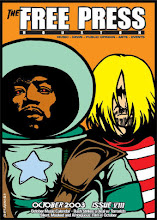Gomorra

There's nothing subtle about Gomorra a sweeping epic of crime and corruption based on actual mob operations in the Italian provinces of Naples and Caserta. The opening sequence hits you over the head like brick dropped from on high. We witness three men shooting as many victims in a gym, the colors of sweat are mixed with the solid blues of tanning booths. The three hitmen calmly stroll out the front door, each placing their weapon in a bag carried and disposed of by a fourth (female) accomplice. Gommora is a movie where justice is swift and unblinking.
Comparisons to The Godfather and Goodfellas are apt but Gomorrah features a singular narrative that makes it the equal of those mob films not a carbon copy. A series of characters are tangled in the web of their own tragic upbringing. A young boy who wants to join the mob, two teens who use their newfound gang mentality to run amok, a tailor who works in a clothing factory that makes knock-offs of designer wear, a mob boss who speaks softly yet carries out his threats to the letter.
Director Matteo Garrone shot in the actual area depicted in Roberto Saviano's novel. Press notes state that Saviano was put under protective custody in 2006 when the book came out although it's unclear if he still remains in that state. Garrone makes good use of the architecture of a series of apartments that when seen from a distance look like an oblong pyramid. Another striking location revolves around a deep quarry that's being used to dump toxic waste, another profitable venture for the mob that's (according to the book) led to increased cancer related deaths in the area. In the book one character watches Angelina Jolie accepting her Academy Award on television and recognizing her dress as one from the mob operated shop. In the movie this character sees Scarlett Johansson in a similar dress being feted at the Cannes film festival. Another haunting scene shows a line of pubescent boys ready to audition for the gang. The task is being shot in the chest while wearing a bullet proof vest.
The end result is a film that examines the consequences and efficiency of the mob's operation. Nobody is seen hunting down the badguys, in fact the badguys take care of their own. There are so many shots of people counting money in the first reel you may subconsciously feel for your wallet. The end effect washes over the viewer in a mesmerizing way. The Camorra mob exists and are so powerful they buy their way to legitimacy. Gomorrah doesn't judge so much as tell the story with a sly emphasis on the corporate aspect of the various illegal operations.










